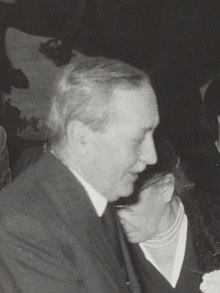Willem Elsschot
Willem Elsschot , pseudonym for Alphonsus Josephus de Ridder , (born May 7, 1882 in Antwerp , † May 31, 1960 there ) was a Flemish writer.
Life
Elsschot studied his older brother in his Belgian hometown on the advice of economics . He then worked in Paris, Rotterdam and Brussels, where he founded the Revue Continentale Illustrée with two colleagues . In 1914 he returned to Antwerp, where he ran his own advertising agency.
Elsschot's experience in advertising inspired him to write his novel Lijmen (1924, in German 'lure to the glue'), in which the dubious practices of an advertising salesman are targeted. The unscrupulous Boorman uses promising stories to encourage unsuspecting small traders to advertise in the Algemeen Wereldtijdschrift (Allgemeine Weltzeitschrift), and then burden his customers with large quantities of the magazine, which is printed in huge numbers but only for the advertisers. With its concise, ruthless style that borders on cynicism, the novel is considered to be a high point of urban Flemish fiction. It belongs to the New Objectivity style . The book was filmed together with the follow-up novel Het been (German: the leg) in 2000 by Robbe de Hert.
In addition to novels, some of which were autobiographical, such as Villa des Roses (1913) and Tsjip (1934), Elsschot also wrote two well-known novels: Kaas (1933) tells the disillusioning story of a little office worker, Laarmans, who wants to rise in society by founding a cheese business. The book was first published in German in 1952 under the title Kaas (Diederichs, Düsseldorf-Cologne), and again in 2005 as cheese (Unionsverlag, Zurich). In Het dwaallicht (1946, in German: the will-o'-the-wisp), the first-person narrator and three sailors go in search of a girl named Maria in Antwerp at night. The book was awarded the Belgian State Prize in 1948 and was published in German in 2009 under the title Maria in der Hafenkneipe .
In addition to his prose works, Elsschot wrote a volume of poetry Verzen van vroeger (1934, German: Verse von vor former), which dealt in a rebellious and bitter tone among other things with motifs such as mother and marriage.
Elsschot is one of the few classics of Dutch-language literature that enjoys great and lasting popularity both with literature connoisseurs and the general public. His laconic style, his confident irony and his unsentimental choice of topics, which does not exclude pity, probably contribute most to this.
In 1995 the asteroid (6309) Elsschot was named after him.
Works
- Villa des Roses . Novel. Suhrkamp, Frankfurt am Main 1993. ISBN 3-518-22121-3
- Cheese ( kaas ). Novella. Unionsverlag, Zurich 2005. ISBN 978-3-293-20337-2
- Leimen ( Lijmen ). Novel. Unionsverlag, Zurich 2006. ISBN 3-293-20367-1
- Maria in the Hafenkneipe ( Het dwaallicht ). Novella. Unionsverlag, Zurich 2009. ISBN 978-3-293-00410-8
Web links
- Literature by and about Willem Elsschot in the catalog of the German National Library
- Willem Elsschot on the website of the Unionsverlag
| personal data | |
|---|---|
| SURNAME | Elsschot, Willem |
| ALTERNATIVE NAMES | de Ridder, Alfons |
| BRIEF DESCRIPTION | Flemish writer |
| DATE OF BIRTH | May 7, 1882 |
| PLACE OF BIRTH | Antwerp |
| DATE OF DEATH | May 31, 1960 |
| Place of death | Antwerp |
